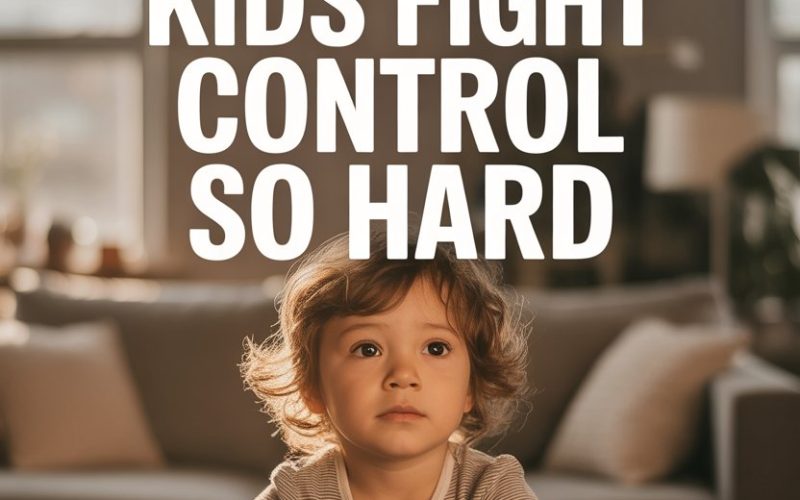Every parent knows a “spirited” child. You know, the one who’s got a black belt in negotiation and an Olympic medal in “No.”
If you’re raising a child whose motto seems to be “My way or the highway,” you’ve likely wondered why they resist even the smallest requests—and why your reasonable explanations are met with the emotional equivalent of slamming a bedroom door.
Let’s peek into the curious mind of your strong-willed kid and discover what’s really going on (and what on earth you can try tonight to keep your own hair from turning grey before its time).
What’s Actually Happening Inside Their Heads
Strong-willed children don’t wake up plotting how to make you question your life choices. Beneath that ironclad determination is a brain wired for independence and authenticity.
Research from the Yale Center for Emotional Intelligence notes that these kids tend to have a heightened sense of autonomy and a deep need to feel heard.
In plain terms: they want to steer their own ship, even if it’s a paper boat in the bathtub.
When you ask them to put on shoes, and they melt faster than a lolly in the sun, it’s not just about the shoes. It’s about feeling like they have no say.
That drive for control is part of their temperament, not a character flaw (or a personal vendetta against your sanity).
Control Is Oxygen to Them
Imagine being micromanaged at work by someone who insists you staple papers with your left hand and hum the national anthem while you do it. You’d rebel too.
That’s what life can feel like for a strong-willed child. Every command, every “because I said so,” chips away at their sense of agency.
According to child psychologist Dr. Ross Greene, “Kids do well if they can.” If they’re fighting you at every turn, it’s not because they want chaos; it’s because they’re desperate to have a say in their tiny corner of the world.
Testing Boundaries Is Practising Leadership
While it may feel like mutiny at mealtimes, pushing back against authority is how strong-willed children practice decision-making.
The late Dr. Stanley Turecki, an expert on spirited children, explained that these kids aren’t just stubborn for the sake of it—they’re honing skills they’ll need as adults: self-advocacy, persistence, and critical thinking.
Annoying now? Most certainly. Useful later? You bet.
Power Struggles: The Never-Ending Tug of War
Picture this: you ask your child to turn off the telly. They shout, “I’m not finished!” You insist. They double down. Suddenly you’re both locked in a battle that would impress ancient gladiators.
Strong-willed children sense when a conversation has morphed into a contest of wills. At this point, compliance isn’t even on the menu.
Rebellion has become the goal. The more you push, the more they dig in their heels. It’s less about who wins, more about not losing.
Personality Traits Fanning the Flames
Certain personality traits make strong-willed kids extra allergic to feeling controlled:
- Intense focus: If they’re building a LEGO castle, wild horses couldn’t drag them away.
- Sensitivity to injustice: “Why does my sister get to go first every time?”
- Desire for logical explanations: “But why do I have to eat green beans?”
These qualities mean they’re not just stubborn—they’re analytical, passionate, and fiercely loyal to their own sense of fairness (even if that fairness seems to only benefit them).
Classic Triggers of the Strong-Willed Meltdown
Certain situations practically guarantee a standoff:
- Sudden transitions (“Time for bed!” right as they find their groove)
- Arbitrary rules (“Because I said so” is their arch-nemesis)
- Micro-managing (“No, not that spoon”)
- Lack of choices (“You have to wear this jumper”)
Understanding these hot buttons doesn’t mean giving in to every demand—just knowing what sets them off can help you sidestep World War III over mismatched socks.
The Secret Power of Giving Choices
Offering choices is like magic for strong-willed kids. It lets them feel in control while you steer the general direction.
Child development experts frequently recommend offering two acceptable options—“Would you like carrots or peas with dinner?”—instead of open-ended questions or flat-out orders.
Suddenly, dinnertime isn’t an ultimatum; it’s an opportunity to negotiate like a tiny United Nations delegate.
Connection Always Beats Control
Strong-willed kids are surprisingly sensitive to feeling respected and understood.
Dr. Laura Markham, author of Peaceful Parent, Happy Kids, suggests that empathising—reflecting their feelings and offering hugs even when you’re seeing red—can defuse power struggles faster than any time-out.
Try: “I see you really want to keep playing. It’s hard to stop when you’re having fun.” Often, just knowing you get it is enough for them to (eventually, grudgingly) cooperate.
Consistency: Your Best Friend and Worst Enemy
Strong-willed kids are like little lawyers. If your rules change based on how tired you are, they’ll spot the loophole and park a lorry in it.
Consistency isn’t just about routines—it’s about calmly following through, every single time. If bedtime is 8 pm, it’s 8 pm, even if your child presents a PowerPoint on why they need an extension.
It’s tedious, but over time, predictability lowers their anxiety and boosts cooperation.
Teaching “Why” Is Worth the Extra Breath
Many strong-willed children won’t accept “just because.” They’re not trying to be difficult; their brains genuinely crave understanding.
Explaining your reasoning (“We hold hands in the car park so you stay safe from cars”) helps them cooperate without feeling railroaded.
Will they always agree? Not a chance. But trust grows when you treat their questions with respect—even if you’re explaining why pyjamas aren’t appropriate for Tesco.
Pick Your Battles Like a Pro
Not every hill is worth dying on. Strong-willed kids force you to prioritise what really matters.
Are they wearing odd socks? The world keeps spinning. Insist on helmets for biking, seatbelts in the car, and teeth getting brushed. The rest is negotiable.
Bonus: letting them “win” on small things fills their control cup and reduces resistance when it counts.
Self-Regulation: The Hardest Skill to Teach (and Learn)
Strong-willed kids often have big feelings and even bigger reactions. Your own calm presence is the most powerful tool in teaching self-regulation.
The Harvard Center on the Developing Child highlights that co-regulation—helping your child manage emotions by modelling calmness—lays the groundwork for their future emotional skills.
Try taking three deep breaths before responding (or hiding in the pantry for a biscuit break—no judgement). Then coach your child through naming their feelings and finding alternatives to shouting or stomping.
When to Seek Backup
Occasional battles are par for the course, but if every day feels like a siege, and nothing seems to work, reaching out to a child psychologist or family therapist can make a world of difference.
Sometimes, a neutral party helps you decode your child’s behaviour and gives you new strategies—no shame in that game.
Why Strong-Willed Kids Might Just Save the World
Strong-willed kids are the future activists, inventors, and leaders. While their “No!” might drive you bonkers now, that same spirit lets them stand up to bullies, defend their friends, and question dodgy rules as adults.
Your job isn’t to crush their will, but to guide it—so someday, they use that power for good (and maybe bring you a cuppa in your old age).
Parenting the Strong-Willed: Finding Your Groove
Life with a strong-willed child isn’t for the faint of heart, but it does come with its own brand of joy and pride.
Embracing their need for control, offering choices, staying consistent, and picking your battles—all these moves help you turn daily standoffs into chances for growth.
Will it ever be easy? Not likely.
Will you become a master negotiator, patience Jedi, and meme-worthy snack artist? Absolutely.
And who knows—while you’re teaching your strong-willed child how to channel their power, you might just discover a little more of your own.




